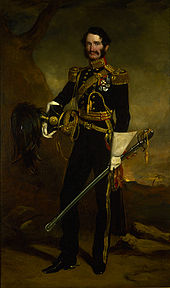Hope Grant
Sir (James) Hope Grant G.CB (born July 22, 1808 - March 7, 1875 in London ) was a British general and fought in various British colonial wars.
Life
Grant comes from a Scottish gentry family. His brother was the painter Sir Francis Grant , a member of the Royal Academy of Arts . Hope Grant joined the British Army in 1826 as a cornet with the 9th Lancers . He served under George Elliot and Hugh Gough in the First Opium War between 1840 and 1842 . After he was promoted to major , he was transferred to India . He took part in the First Sikh War in 1845/46 and fought with great honors against the Sikhs in the Battle of Sobraon (February 10, 1846) .
1848/49 Grant took over as commander of the 9th Lancers at the Punjab campaign part, distinguished himself in the battle of Chillianwallah again and in 1849 to lieutenant colonel and in 1854 for certification - Colonel promoted.
As commander of the cavalry division, he played a major role in the suppression of the Sepoy uprising . At the head of a flying corps , promoted to brigadier general, he defeated the rebels on December 10, 1857 on the Jamna and on February 21, 1858, stormed the Mingundsch fortress . On March 23rd, he destroyed the troops of the Raja Jajal-Singh near Kari and on June 13th achieved a brilliant victory near Nawabganj near Lucknow ( Lucknow ). Then he was able to occupy Faisabad on June 29th . With Lord Clyde's vanguard , he crossed the Gagra on November 25, 1858 and drove the remains of the rebels across the border from Nepal . For the reconquest of Lucknow he was appointed major general and awarded the Bath Order.
In 1860, with the local rank of Lieutenant General , he led 11,000 British and Indian troops in the British-French expedition to China in the Second Opium War . On August 1, the troops landed near Pei Tang and on August 21 they captured the Taku forts that secured the estuary to Beijing . It reached Beijing on August 22nd, occupied Tien-tsin on August 25th and defeated the Chinese army at Chang-kia-wan on September 18th and again on September 21st at Pa-li-kiau. After his victorious entry into Beijing on October 13, James Hope Grant was promoted to regular lieutenant general.
Grant then received thanks from both Houses of Parliament and in 1861 was appointed Commander in Chief in Madras . He left this post in 1865 to take on the post of Quartermaster General in the British Army. In 1870 he became commander of the Aldershot garrison and in 1872 he was promoted to general.
In Aldershot he played a major role in the modernization of the British training system following the findings of the Franco-German War .
literature
- Henry Knollys: Life of general Sir Hope Grant . 2 volumes. W. Blackwood & Sons, Edinburgh et al. 1894.
- Philip J. Haythornthwaite: The Colonial Wars Source Book. Arms and Armor Press, London 1995, ISBN 1-85409-436-X .
| personal data | |
|---|---|
| SURNAME | Grant, Hope |
| ALTERNATIVE NAMES | Grant, James Hope (full name) |
| BRIEF DESCRIPTION | British general |
| DATE OF BIRTH | July 22, 1808 |
| DATE OF DEATH | March 7, 1875 |
| Place of death | London |

